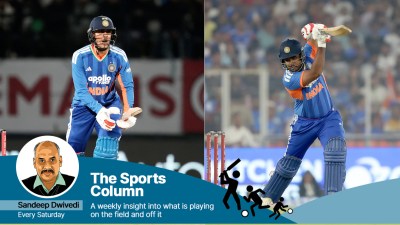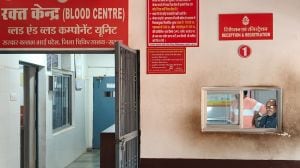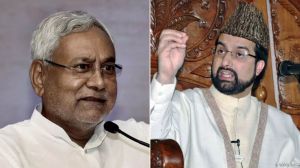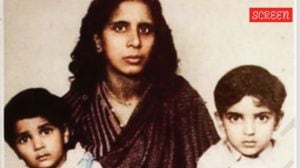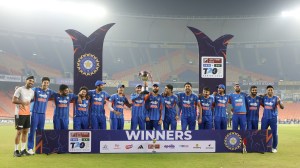Key takeaways from Mohan Bhagwat address: Bridging caste divides to rejecting ‘weakness’ to targeting OTT platforms
In his Vijayadashami speech, RSS chief also touches upon issues impacting law and order and social harmony in various states, from Manipur and J&K to Kerala and Bihar.
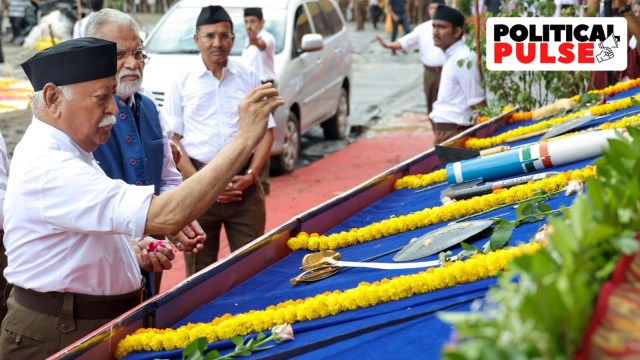 RSS chief Mohan Bhagwat performs 'Shastra Puja' during a function organised on the occasion of Vijayadashami, in Nagpur. (PTI)
RSS chief Mohan Bhagwat performs 'Shastra Puja' during a function organised on the occasion of Vijayadashami, in Nagpur. (PTI)With the Opposition Congress continuing to focus on caste and demanding a national caste census, RSS chief Mohan Bhagwat on Saturday called for the larger Hindu community to reach out to the depressed classes to build a cohesive Hindu society. This was among the highlights of Bhagwat’s Vijayadashami speech delivered in Nagpur on Saturday. The RSS chief’s annual address is a pointer to the Sangh’s agenda for the next year. And the issues raised by him would be taken up for implementation by the organisation. Here are some key takeaways from Bhagwat’s speech.
Building cohesive society
While ending caste discrimination has been a long-term project of the Sangh and Bhagwat has spoken about it multiple times, the Saturday speech was the first instance of the RSS chief elaborating at a major event how this objective is to be achieved.
“Our diversity has become such that we have even divided our saints and deities. Why should Valmiki Jayanti be celebrated only in Valmiki colony? Valmiki wrote Ramayana for the entire Hindu society. So, all should celebrate Valmiki Jayanti and Ravidas Jayanti together. All festivals should be celebrated together by the entire Hindu society. We will go to the society with this message,” Bhagwat said.
The RSS chief said the first condition for a healthy and able society is social harmony and mutual goodwill among different sections.
“This task cannot be accomplished by merely organising some symbolic programmes. In all sections of society, there should be friendship between individuals and families. Wherever I go and where I work, I should have friends among all kinds of people. Languages can be diverse, cultures can be diverse, food can be diverse, but this friendship of individuals and families will bring harmony in society,” he said.
Taking the argument further, Bhagwat said there should be an environment for the participation of all sections of society in places of public use and worship such as temples, drinking water sources, crematoriums etc. He said all sections should understand the needs of the weaker sections of society that arise from the circumstances they face.
Organise against ‘stone-pelting’
Bhagwat also asked the Hindu society to organise itself to protect against “stone-pelting” on religious processions.
“There were incidents of stone pelting on Ganesh Visarjan. Why did it happen? There was no reason. To control the situation is the job of the administration. They do, but are also lax sometimes. But till the time the administration intervenes, society has to suffer. So, society should remain prepared and not let hooliganism prevail. To protect one’s life and property is our right. Administration should be allowed to do its work, but we have the job of protecting our life,” Bhagwat said.
Urging the society to remain alert to this, Bhagwat said, “Society must remain organised. Even gods do not protect the weak. A horse, elephant or lion is not sacrificed for the yajna, a goat is. … Durbal rehna atyachar hai (It is an atrocity to remain weak).”
The RSS chief, however, clarified he was not asking people to fight but to remain organised to protect themselves.
Restraint in strength
While exhorting the community to develop and wear its strength, Bhagwat asked people to also exercise restraint when provoked by sensitive issues.
He even appeared to make references to some contentious legislation, such as the Uniform Civil Code, which the government is expected to bring in the near future.
“Our country is full of diversities. We do not consider them as differences… In a country with such an ancient history, vast area and huge population, all these specialties are natural. If a new law is brought, it may not make everyone happy. But this diversity is not divisive, but our speciality. To quarrel among each other over such issues is not right. Pride in one’s own distinctiveness and sensitivity towards them is natural. But this sensitivity must be expressed through restraint,” Bhagwat said.
Arguing that tolerance and harmony are Indian traditions, Bhagwat said, “Defying the law and order and creating disturbances through illegal or violent means, holding an entire community responsible for them, to disrespect someone’s faith, place of worship, holy book or their sages in thought or in words, these are neither prescribed nor beneficial for the country or for anyone in the country. If anyone else does it, then too we must act with restraint.”
Troubles in states
Bhagwat also touched upon issues impacting law and order and social harmony in various states, from Manipur and Jammu and Kashmir to Kerala and Bihar.
Referring to “tactics of divisive elements to break the society across Bharat today”, he said, “There is an attempt to create conflict by creating separation on the basis of caste, language, province etc. Arrangements are being made so that the society, entangled in petty selfishness and small identities, does not understand the all-consuming crisis looming over their heads until it is too late. Due to this, today Punjab, J&K, Ladakh on the north-western border of the country; Kerala, Tamil Nadu on the sea border; and the entire Purvanchal from Bihar to Manipur are disturbed,” Bhagwat said.
Suggesting that some of these troubles were a result of people resorting to violent means of protest, Bhagwat said, “There is a sudden increase in the incidents in the country that incite fanaticism without any reason. There may be dissatisfaction in the mind about the situation or policies, but there are democratic ways to express it and oppose them. Instead of following these ways, resorting to violence, attacking a particular section of the society, resorting to violence without reason, trying to create fear, is hooliganism.”
‘Corruption of values’
Bhagwat held that there was a rapid slide in societal values, suggesting that society needs to take steps and strengthen the family system to arrest the decline. He also blamed the OTT platforms for alleged “perversion in society” and sought their regulation through legislation.
“The kind of things that are talked about on OTT platforms… It would be indecent to even describe them, they are so abhorrent. That is why I say it has to be regulated through law. It is among the key reasons for the corruption of our values,” he said.
Some OTT platforms have recently faced considerable criticism from various Hindutva groups for their depiction of the Hindu scriptures and their narratives of Hindutva politics. Series such as Taandav have faced legal troubles for their depiction of Hindutva politics, while Netflix recently dropped Tamil film Annapoorani: The Goddess of Food following protests that the film’s suggestion of non-vegetarianism in Ramayana hurt Hindu sentiments.
- 01
- 02
- 03
- 04
- 05


